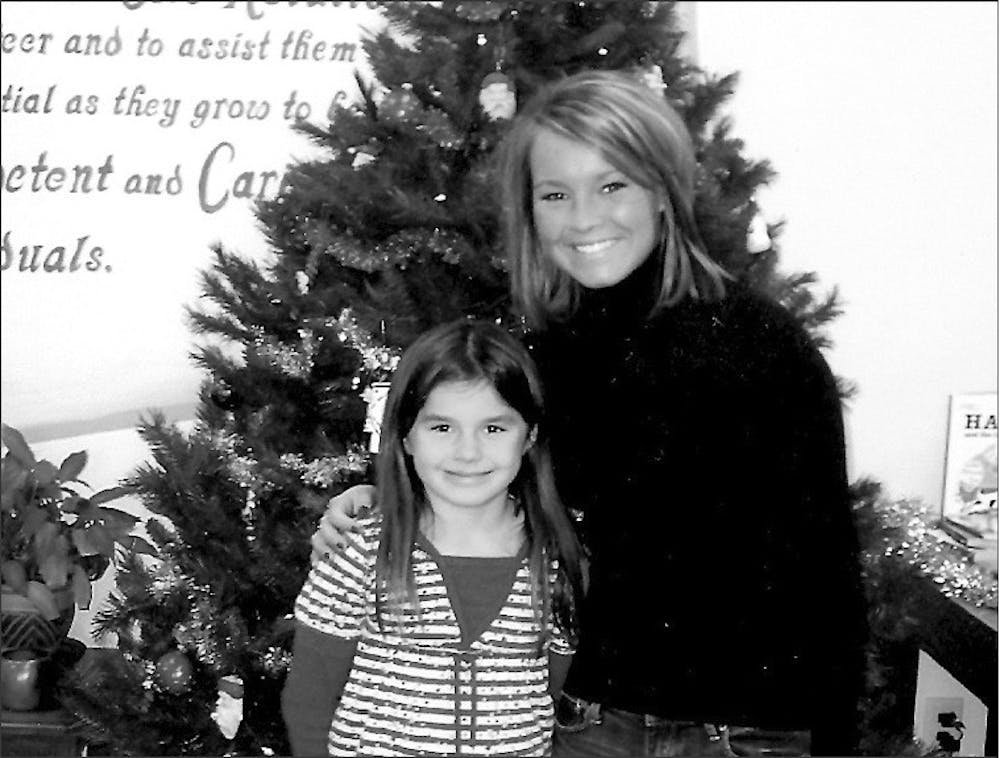
Senior Chelsea Allen, who participates in the Big Brother Big Sister program, enjoys a Christmas celebration with her little sister, Brianna Howard. (CONTRIBUTED PHOTO)
With more than 200 volunteers annually, Miami University has forever shaped the Big Brother Big Sister (BBBS) program in Butler County.
Miami is the number one supplier of volunteers for the Butler County program and has had a large impact on how the program is run, said Julie Dichtl, vice president of development for BBBS.
"The students definitely (have) had a big impact on how we run our program," Dichtl said. "We know that we're not going face challenges like we do throughout the county when we're in Oxford because the Miami students like our program."
Miami students have opened the door to a new way to run the program. According to Dichtl, BBBS started a site-based program specifically for Miami students approximately 10 years ago.
"(Miami students) are actually the reason we started out site-based program," Ditchl said. "A lot of the Miami students don't have a car or aren't here year round so we came up with our site-based program which was started at two elementary schools in Oxford, the program only lasts during the academic year."
Students meet, as a group, their little brother or sister at the respective elementary school and play games, explore the traveling library that BBBS provides, eat snacks, work on homework or just hang out for an hour and a half after school, once a week.
"The program was so successful that we've expanded that program to 24 programs throughout the county," Ditchl said.
Most Miami students opt for the after school program, according to Kelley Eversole, BBBS match support specialist.
Eversole said there's an after school program at Kramer Elementary, Bogan Elementary and Talawanda Middle School.
Because of the large number of college students, Oxford waitlists for a big brother or big sister do not last long.
Enjoy what you're reading?
Signup for our newsletter
"With the high density of students, our Oxford kids are matched first because we have that huge group of students," Ditchl said.
However, this is not the case for most of the Butler County region, Ditchl said.
"We currently have 189 children that are waiting to be matched," Ditchl said. "Typically we would have somewhere between 75 to 100 students, our program has been impacted by the economy."
This waiting list is for the community-based program, where a mentor with access to a vehicle drives and picks up their little for a movie or other off-site activity.
Jessica Greene, vice president of development for BBBS, said the program does ask students if they can drive to meet their little brother or sister.
"If a Miami Oxford student can reach a population by car, we're more likely to serve them quickly, if they can't our wait list is six months to a year," Greene said.
Miami junior Emily Jeffers is one of the students who travels to pick up her little weekly.
"I decided I was going to do (take a little) at the beginning of my junior year," Jeffers said. "I got my little in October (2009)."
Jeffers' little is 12 years old. The two spend lots of time in Oxford together. Jeffers saw the program as an opportunity to help the Oxford community.
"I thought this was a new way I could get involved in the community and also help someone in the community," Jeffers said.
Greene said the demographic of the region is vital to understanding why the program is so necessary.
"About 132 children in the Oxford community participate," Greene said. "Most of our families are from lower-income families and demonstrate some need for service."
Because of the demographics of the region, Ditchl said Miami students are great role models to the children enrolled in the program who may have not thought about college before.
"One of the things about the Miami students that the kids like is they're old enough for the kids to look up to but they think they're cool because they're college kids," Ditchl said. ‘Many of our kids live in poverty, they don't know a lot about the college experience. (Students) can share that it's not just going to school, it's not just taking tests. It's being in a fraternity or being in this organization, it really opens up our kids eyes."




